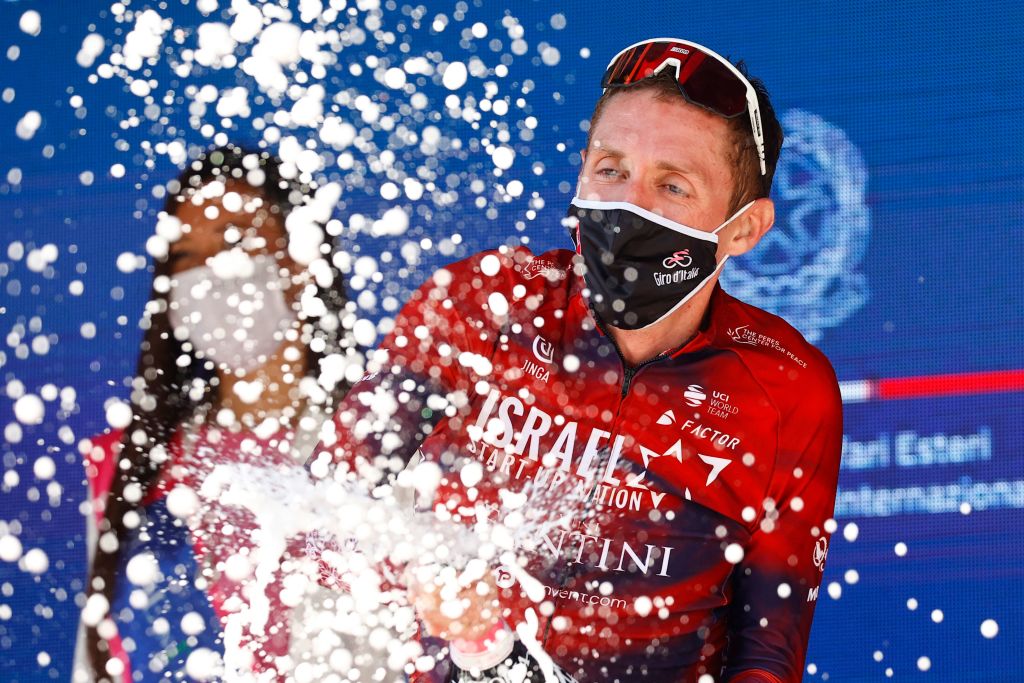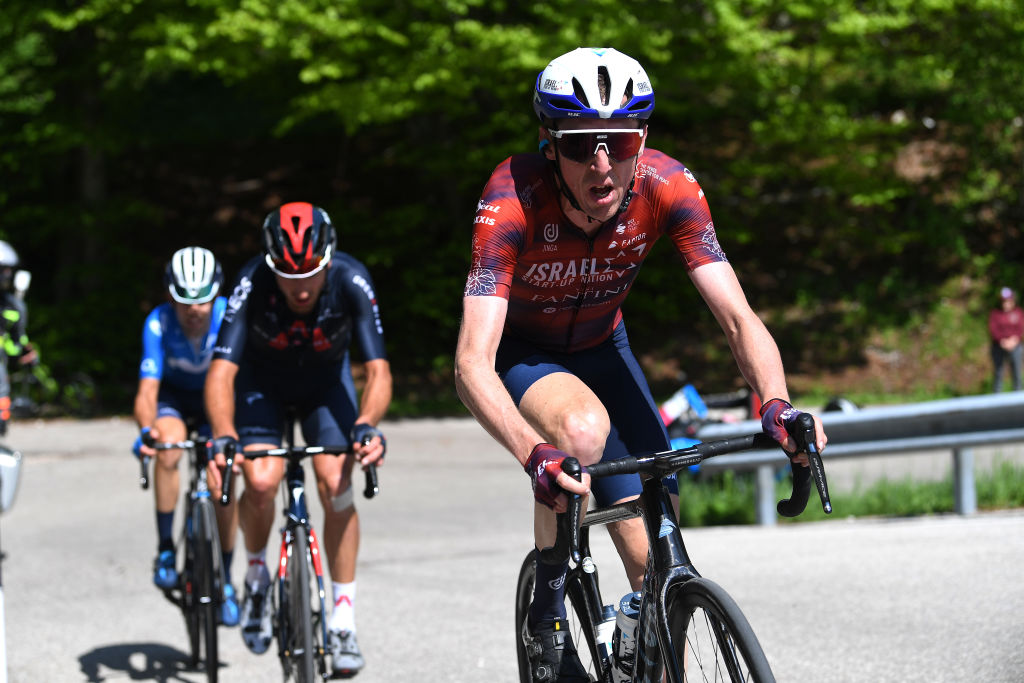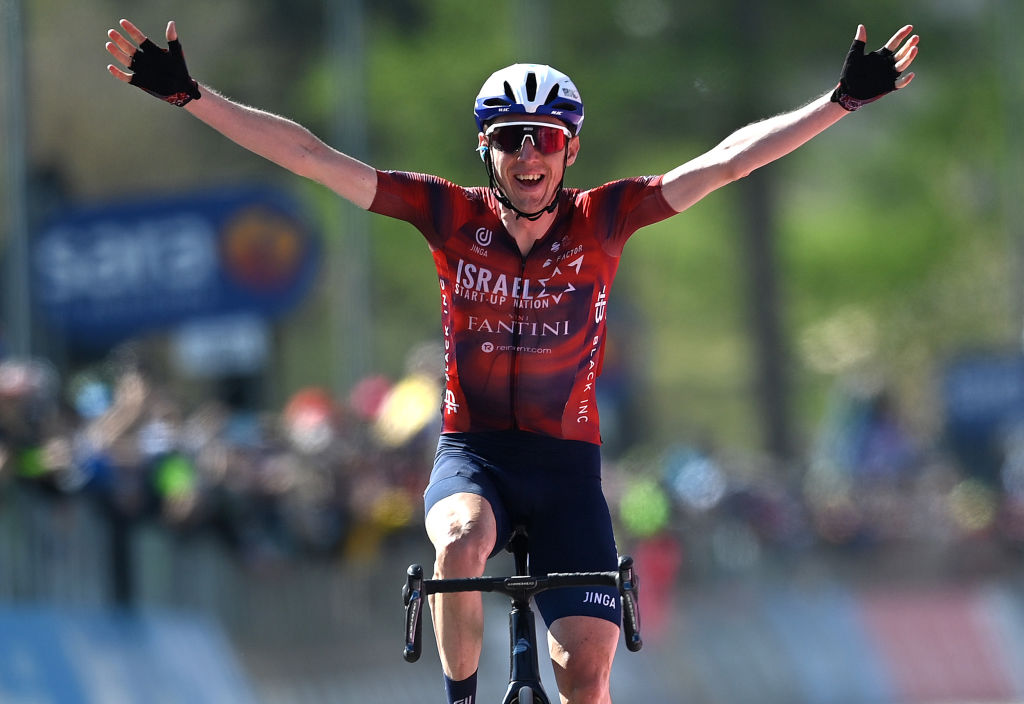Dan Martin impresses at Giro d'Italia despite spring COVID
Israel Start-Up leader takes mountain stage and tenth overall despite losing time on dirt roads

Eleven years had passed since Dan Martin last completed the Giro d’Italia. He was callow then, a young rider still finding his way in the professional peloton, but those indelible first impressions were confirmed by another Grand Tour of Italy as a more experienced man.
In 2010, Martin had struggled with illness as the race wore on, and making it to Verona in 57th place was a masochistic part of his apprenticeship. This time around, he raced as a team leader of Israel Start-Up Nation, soloing to stage victory at Sega di Ala and finishing 10th overall. The context was very different, the results far better but the hardship was still familiar.
“It was about as horrific as I remembered the first time,” Martin told Cyclingnews after he crossed the line beneath the Milan Duomo. He laughed as he spoke, but he wasn’t entirely joking.
“I came here with the idea of getting a stage victory, and then seeing how far I could get into the top ten. Obviously, I didn’t get very far into the top ten, but I did it. Now I’ve done the top ten in all three Grand Tours and a stage win in all three as well, so it’s pretty special.”
Such a thought seemed remote in March, when Martin was forced to miss Tirreno-Adriatico with what his Israel Start-Up Nation team had described at the time as “late developing health issues.” Martin revealed in Milan that he had, in fact, been diagnosed with the coronavirus.
“We didn’t really publicise this fact, but way back in March, when I was supposed to be at Tirreno, I actually got COVID pretty bad,” Martin said. “I had to take a week off the bike and given how bad I felt, I had no idea whether I was going to be here or not.
“But then I had a remarkable recovery and I managed to race Catalunya and after that, we said ‘okay, the Giro is actually quite realistic now.’ It was a setback as far as the preparation goes, but I don’t think it really affected me because I came here with really good condition.”
Get The Leadout Newsletter
The latest race content, interviews, features, reviews and expert buying guides, direct to your inbox!

Losing time on the Montalcino gravel
Martin looked in contention for a podium place through the Giro’s opening phase, matching eventual winner Egan Bernal at San Giacomo on stage 6, and he limited his losses across the opening week better than most. His race took on a different guise, however, when he conceded six minutes to the favourites on the gravel at Montalcino in the second week after being distanced on the first sector of sterrato.
“I lacked trust on the gravel,” Martin confessed.
“Of course I was worried beforehand, but I didn’t know how bad that first section was going to be. We didn’t go to recon it and that was a mistake. That was our downfall.
“The other three sectors I was absolutely fine on and I almost came back to the front group. It was just that first section… It was a jump into the unknown, I didn’t know what to expect on the downhill. I just didn’t enjoy it at all.”
Such a setback might have been terminal, but Martin, who has spent a career insisting that he weighs out his Grand Tours in daily increments, could process that disappointment quicker than most.
“I knew there’d be opportunities in the last week and losing that time would give me the chance to go for those opportunities for a stage victory,” he said.
The win came on the most demanding climb of the Giro, at Sega di Ala, where Martin managed to hold off João Almeida and Simon Yates after spending the day in the break and after leading all the way up the preceding Passo San Valentino.
Martin’s victories at Liège-Bastogne-Liège and Il Lombardia headline his palmarès, but this was arguably the greatest athletic exploit of his career.
“I haven’t really thought about it yet. That’s the problem with winning a stage in a Grand Tour, you have to refocus immediately and concentrate on the next day again,” said Martin, who climbed back into the top ten in the race’s final days.
“On all of the mountaintop finishes, on what I guess you could call traditional Grand Tour stages, I was in the front.”

Talking sense about racing in extreme weather
Some traditionalists were quick to criticise when the most arduous stage of the Giro, the Dolomite tappone to Cortina d’Ampezzo, was shortened after the riders’ representative body the CPA raised concerns about the frigid conditions atop the Pordoi and the Fedaia. A compromise was brokered that saw the gruppo forgo those two passes while maintaining the final climb and descent of the Passo Giau.
Martin was among the early attackers on a stage that proved to be as full-throated as any on this Giro, and the day ended with Bernal all but sealing overall victory by attacking and soloing clear on the upper reaches of the Passo Giau.
The stage may have been shortened, but it was misguided to argue that the race had been diminished.
“I think racing in extreme conditions is harmful to our health, and I think the only people commenting were people who were not actually here,” said Martin.
“If we started the stage and had to cancel midway through because the conditions were too bad, then we’d have had 200 cyclists standing on the side of the road waiting for team buses to collect them.
“Obviously this time around, the weather was better than the forecast. And we perhaps could have done the stage, but I think it would have been horrific. And it was already horrific. At that point, it’s a case of, why are we doing this? We’re doing this for entertainment, but if people want to see other people suffering and risking their lives, I think they should go watch another sport. We risk our lives every day anyway. With the weather conditions, we have to control the controllables.
“The important thing to note is we as bike racers want to race our bikes, but we want to do it in safe conditions. It was actually the riders who suggested the shortened course that included the Giau, because we still wanted to race.”
Recovering for the Tour de France
Martin’s respite after the Giro will be short lived, given that he is set to follow it with the Tour de France, racing the sport's hardest Grand Tour double for the first time in his career.
With the Tour shifted earlier on the calendar due to the Tokyo Olympics, the Grand Départ is now under four weeks away.
“It’s about plotting how best to recover," Martin explained.
"It’s going to be a challenge, something I never done before, but I went really well at the Vuelta after doing the Tour last year."
Martin will line up in France alongside Chris Froome and Michael Woods as leaders of Israel Start-Up Nation. His precise role in July is yet to be defined.
“We haven’t really talked about it yet, but with the two long TTs, I think GC is probably out of the question for me this year, and especially after riding the GC here, so to speak. It would be fun to ride the Tour and just see what I can do.”

Barry Ryan was Head of Features at Cyclingnews. He has covered professional cycling since 2010, reporting from the Tour de France, Giro d’Italia and events from Argentina to Japan. His writing has appeared in The Independent, Procycling and Cycling Plus. He is the author of The Ascent: Sean Kelly, Stephen Roche and the Rise of Irish Cycling’s Golden Generation, published by Gill Books.